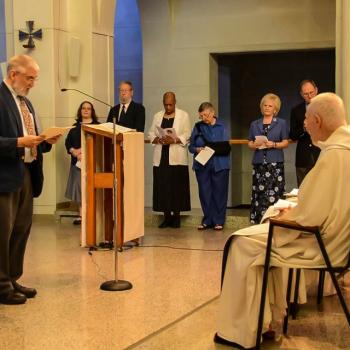
The Christian faith stands on the recognition that God is Love. Therefore, love is the heart of all spirituality, including contemplative prayer. We are called not just to be contemplatives — we are called to be relational contemplatives.
Writing in the third century, the Neoplatonist philosopher Plotinus had this to say about mysticism:
This is the life of gods and of the godlike and blessed among men, liberation from the alien that besets us here, a life taking no pleasure in the things of earth, the flight of the alone to the Alone.
Following this, Evelyn Underhill wrote:
Mysticism, like revelation, is final and personal. It is not merely a beautiful and suggestive diagram but experience in its most intense form. That experience, in the words of Plotinus, is the soul’s solitary adventure: “the flight of the Alone to the Alone.”
Underhill refers to Plotinus almost 50 times in her important book Mysticism: A Study in the Nature and Development of Spiritual Consciousness. As important as that book is, I think we need to keep in mind that it was published in 1911, long before Underhill participated in a faith community (she would only become involved in the Church of England more than a decade letter, after receiving spiritual direction from the Catholic theologian Friedrich von Hügel). Plotinus’s vision of mysticism might be part of what Christian mysticism entails — but only a part. It would be just as accurate to describe Christian mysticism as not just the journey of the alone to the Alone, but also the community to the Trinity.
Furthermore, Underhill describes mysticism as “experience in its most intense form.” There are a lot of problems with reducing mysticism to experience, but for now I’d like to suggest this: that Christian mysticism actually involves relationship in its most intense form — because it is a trinitarian expression of relationship: relationship with God, relationship with self, relationship with others. All three are necessary for Christian mysticism. For Christians, all three forms of love are necessary for contemplation.
Jesus answered, “The first is, ‘Hear, O Israel: the Lord our God, the Lord is one; you shall love the Lord your God with all your heart, and with all your soul, and with all your mind, and with all your strength.’ The second is this, ‘You shall love your neighbor as yourself.’ There is no other commandment greater than these.” (Mark 12:29-31)
We love God: In prayer, in worship, and in giving our lives to God, seeking to conform our mind, heart and will to God’s. We love ourselves: in appropriate self-care, in self-knowledge, in seeking healing and wellness. We love others as ourselves: we orient our lives to compassion, mercy and forgiveness, seeking to love others the way God loves them.
So what does all this have to do with contemplation, or mysticism? You might be wondering: “But didn’t Jesus instruct us to go into our room and pray in secret?” Indeed he did (Matthew 6:6). So there is a solitary dimension to the mystical life. And it’s probably true that for many people (Christian or otherwise), that solitary dimension may be sorely lacking in their lives. So we all need to be mindful of the importance of silence, solitude, retreat, and aloneness in cultivating a rich and meaningful contemplative life.
But if we pay too much attention to Plotinus, or even to young Underhill, we could be misled into thinking that the interior dimension is the totality of the mystical life: that spirituality is all about the inner experience. That, at least for Christians, would be a distortion.
It’s a paradox: we retreat into the inner room (including the solitude of silent prayer) not to escape from relationships, but rather to deepen relationships: all relationships (with God, self, and others). When we directly cultivate our relationship with God (as we do during contemplative prayer), we are simultaneously cultivating our capacity for authentic care of self and compassionate love of others. We are called into the silence but then led out of the silence, a rhythm similar to all the great rhythms of life: breathing in/breathing out, the heart beating/resting; work and Sabbath, day and night, summer and winter. Life is an alternating current: and so is the mystical life. We sink into solitude only to be sent forth into relationship.
I love the Buddhist writer Thich Nhat Hanh’s concept of “interbeing” which stresses the relatedness of all things. When you read a book, you are relating not just to the book or the words found in it; you are relating to the tree that gave its wood to make the paper, the soybeans used to make the ink, the soil in which those plants grew, the sun which nurtured them when they lived. You are relating to all the people who helped to get the book to you: not just the author, but the editor, the designer, the marketing team, the printers, the shippers, the retailers, and so forth. That single book represents a web of relatedness.
Contemplation works the same way. Think of all the people who support you when you sit down to pray: your parents who gave you life; your teachers who helped to form you; the farmers who grew your food; the people who built the house you live in, or made the clothes you wear, or created the cushion you sit on. The utility workers who provide the energy to keep your home cool in the summer or warm in the winter. And on and on it goes. Even an act as simple as sitting down in silent prayer is held up by a web of relationships.
I’m not suggesting that you need to be thinking about this web while you’re praying in silence (but maybe some prayers of intercession or thanksgiving before or after your silent time would be appropriate). What I am saying is that acknowledging the many relationships that support and uphold our lives can be an important first step to living into a Divine (loving) life, the life of relatedness that we are all called to embrace. It takes many forms: learning from the wise, cherishing your spouse, exulting in friendships, serving those in need, disciplining your children, conducting business fairly with your customers and vendors. But all these relationships are governed by the mandate of Christ: to love our neighbors as we love ourselves. And an important key to manifesting that love in our lives is the prayer of deep silence: where we encounter the mysterious hidden-yet-present love of God.
So: yes, mysticism is the flight of the alone to the Alone. But it’s so much more than that: the self-giving of the community to the Trinity. And we discover that the Trinity is loving us from within, all the time.
Enjoy reading this blog?
Click here to become a patron.














